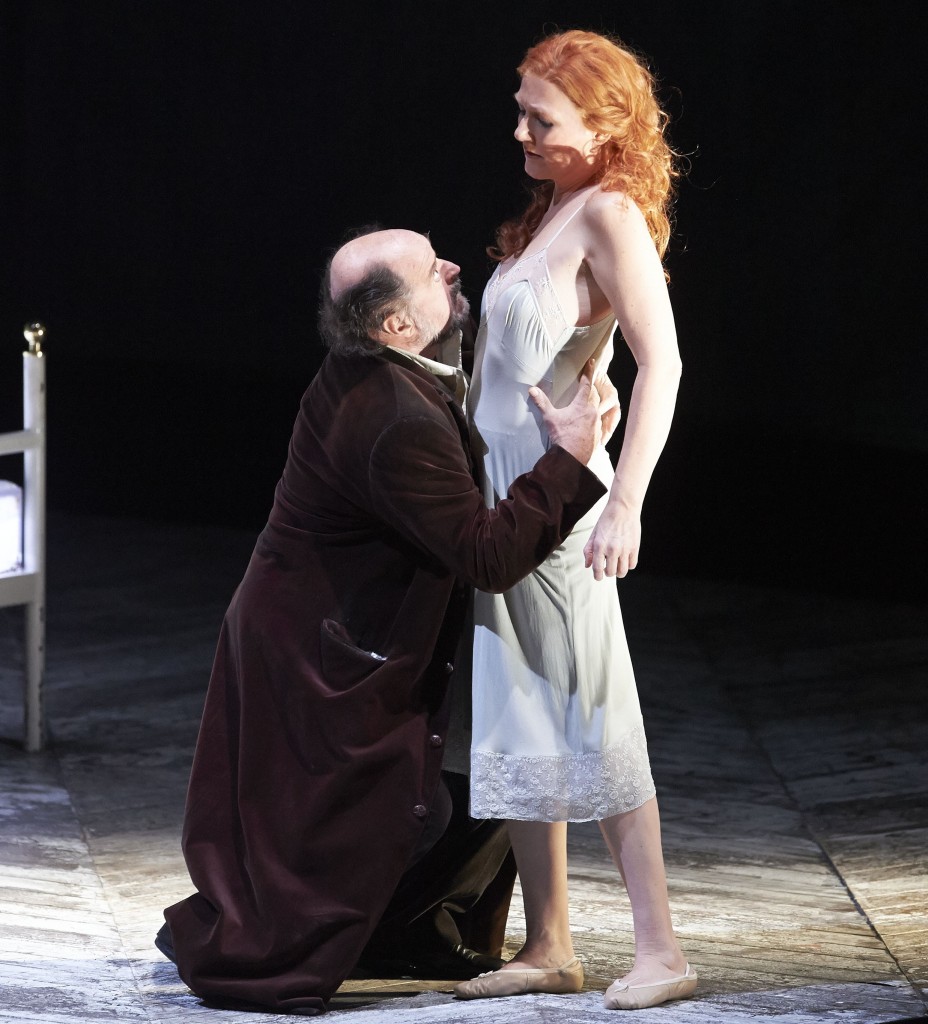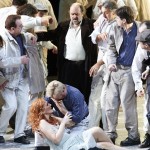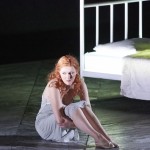 If you’re expecting Shostakovich’s Lady Macbeth of Minsk to be a version of Shakespeare’s you may be disappointed. (Verdi’s Macbeth faithfully followed the play.) ‘Lady Macbeth’ however is synonymous with the ruthless wife who will stop at nothing: whose lust for power transgresses all law and decency.
If you’re expecting Shostakovich’s Lady Macbeth of Minsk to be a version of Shakespeare’s you may be disappointed. (Verdi’s Macbeth faithfully followed the play.) ‘Lady Macbeth’ however is synonymous with the ruthless wife who will stop at nothing: whose lust for power transgresses all law and decency.
This Lady Macbeth, Katerina, comes from a poor family, marries rich provincial merchant Sinowi: a childless marriage. There’s a tyrannical father-in-law Boris to harass her. But the daily monotony is interrupted by the arrival of the servant Sergei. His vicious, lustful amorality spurs them on, firstly disposing of Boris, then, catching the adulterers, Sinowi.
Shostakovich’s opera was banned (1936) on Stalin’s authority: denounced (Pravda) as ‘muddle instead of music’,’deliberately discordant’, ‘its sexual naturalism vulgar’. Katerina’s selfish individualism appeared decadent and bourgeois. And in Shakespeare’s there are no sex scenes. Stalin was anti-intellectual, and a prude.
In Vienna State Opera’s minimalist design (Volker Hintermeier), there’s a bed on a sloping stage. Angela Denoke’s Katerina is lying flat-out on the parquet floor. She can’t sleep. Denoke sings, that morning she had tea with her husband and went to bed. Bored to death! Denoke, red-haired, wearing a grey slip, grasps bedclothes to her, as if yearning for a child, or a man.
Boris (Kurt Rydell) fat, hands in his pockets, enters menacing, bullying . Has she nothing else to do – Shostakovich’s music is dissonant, brutal- pulling away the bedclothes she’s holding. He blames her for her childlessness: she’s ice-cold, passionless. She retorts Sinowi is incapable of fathering: impotent. Boris, the patriarch, is on his knees, pleading; then makes a pass; rebuffed, orders get the poison ready for the rats.
Sinowi (Marian Talaba) appears in a fur-collared overcoat: the chorus of servants lined up are sorry the master has to go away. Make sure she doesn’t forget me: Shostakovich’s trombones are almost laughing with derision. Talaba, a lyrical tenor, here under-powered, sings ‘Be sure no one seduces her.’ Sergei, Misha Didyk, blonde-haired, late 30s, in a light grey suit, slouches insolently. Sergei has a reputation with other men’s wives.
Highly expressionist music, played with passion, and great attention to detail, especially from the woodwind: Ingo Metzmacher, conducting Vienna State Opera orchestra, debuted here 2009 with Matthias Hartmann’s production. A woman is being raped in a washing tub-her clothes stripped-off, thrown up in the air. Sergei climbs in. It’s an ugly, frightening scene, but Denoke looks on spellbound. She rushes in, ‘You men think a lot of your services: women have to sacrifice their lives for their husbands.’ ‘Watch out, I’ll show you what a woman’s good for!’ Sergei- to a playful clarinet solo- pulls her, twists her arm: he wants to wrestle with her! Sergei’s (Didyk’s) face beams with mischief- evil lust. He’s wrestled Katerina to the floor- erotically close- until Boris intervenes . ‘What are we paying you for, louts’, as he disperses the servants looking on. Denoke is sitting on those sacks of rat poison front-of-stage. The music is bristling with a menacing vitality. 
The bedroom: now there are silky white curtains back-of stage. Another day, no one to talk to, sings Denoke. A shadow looms. Time for bed, orders Boris: husband’s away, why keep the candles burning. In Katerina’s aria, she pleads, ‘Who will lovingly fondle my breasts; make love to me… ‘ Her life is ticking away without passion. Beautifully sung by Denoke with a sad tenderness. Now Sergei steals in, purposefully removing his boots. He climbs onto the illuminated bed, overlooking the sleeping Katerina lying on the floor. He’s lording it over her. Then they shadow each other, as if tangoing. He’s stronger than her, will tame her. -Stop it!- She’s afraid. (We see a couple dancing erotically behind the screen.) On the bed, they’re rolling beneath the bedclothes, and then rhythmically, to braying horns and trombones. ‘But Sergei! I am a married woman!’ Many women have said that, he laughs. And, insatiably, they’re doing it all over again.
So Katerina is the bored hausfrau. Her revolt is through sex. Katerina’s is that very modern plight, an existential crisis: not (yet) a mortal sin. Boris’s persistent sexual harassment -and his beating Sergei to an inch of his life- are the motive. Act 2 begins with Boris (Kurt Rydl’s richly expressive baritone) singing of how he’s feeling his age. He had a good life when he was young; and – kicking away the chair- Katerina needs someone to console her, (underlined by Shostakovich’s rudely burlesque wind instruments.) In the next scene Boris whips Sergei, the motion aped by the other servants, beating in time. (He may die on us, one sings.)
Later, Boris twiddles his cane at Katerina; he’s hungry, anything in the cellar? She offers more mushrooms.(Sergei is locked in the cellar.) As she serves, he pokes her skirt up with his cane. Mushrooms delivered , now she wields the cane. Boris falls off his chair, groping around in pain. He’s sinned, he confesses, but susses his was no natural death: only rats die like this when poisoned. ‘Who will take care of Sinowi when I’m gone?’ The men’s chorus kick their legs in a bawdy Russian dance.
A long orchestral interlude. In the bedroom , she dotes over Sergei , beckoning him to wake up. ‘Yes, kiss me ! Not like that! Till my lips hurt and the blood runs to my heart!’ Sergei reminds her husband is coming back. He’s sensitive! Wouldn’t he rather her married man? She’ll make a merchant of him. They’ll marry soon, she sings.
 Denoke’s Katerina is languid; not strident, or grating. She emotes melancholy; suffers l’ennui , boredom. She’s no prototype Lady Macbeth, but relatively sympathetically depicted. Not the demonical ogre, but transgressive modern woman; hers is a crime of passion. She’s addicted to Sergei, but he, in turn, is a serial philanderer.
Denoke’s Katerina is languid; not strident, or grating. She emotes melancholy; suffers l’ennui , boredom. She’s no prototype Lady Macbeth, but relatively sympathetically depicted. Not the demonical ogre, but transgressive modern woman; hers is a crime of passion. She’s addicted to Sergei, but he, in turn, is a serial philanderer.
With her husband’s return- scored with urgent strings, strident flutes, ribald clarinets- Sinowi notices a man’s belt. (She ‘found it somewhere’.) She complains about the way he treats her; he threatens to beat her.- What does he know about love?- She’s tied him with the belt. Sergei creeps in, and soon they’re sitting on top of him, suffocating him. That’s that!- Sergei washing his hands- to the cellar with him.
They’ve taken over, Didyk in a black suit, Denoke in a stylish white gown. ‘We’re going to church now; everything will be alright, she sings . ‘Today is a our day, now and always. (Behind them white apple blossom.) But a drunken builder( Herwig Pecoraro) stumbles on stage singing his whole life’s a mess; Sergei was poor too ; why did Katerina take him, not me; and, looking for booze, finds Sinowi’s body in the cellar.
The scene in the police station is brilliantly satirical- one reason why the opera fell foul of Stalin’s censors. Bodies pop up, hit with truncheons as if they were puppets. ‘We are always on guard against vice’, they sing. An intellectual, roughed-up -smart coat, scarf, bespectacled, like Shostakovich- wonders why man has a soul and dogs not.
The wedding celebration – the couple seated above their carousing guests falling about, the priest swigging his bottle of vodka- is stormed by police thugs, eventually trampling the wedding banquet, kicking the food off.
Nothing prepares us for the final scene, the forced labour camp. The Gulag! Soldiers in greatcoats: wretched prisoners in threadbare, ragged clothing. ‘The road we travel in chains is never-ending and long,’ they sing. ‘Heat and cold torment us; no one has ever suffered like this.’ It’s deeply moving, totally unexpected. Katerina bribes a guard for vodka. She meets up with Sergei. But he reproaches her: your crime, have you forgotten it. She pleads for forgiveness, sings in her aria, it’s hard , when you’re used to luxury, the endless road is hard. But hardest to bear Sergei’s betrayal. We see Sergei making it with Sonietka (Monika Bohinec). He bribed the guard with money from the merchant’s wife, he boasts: can’t bear the sight of her. (But Sergei goes back to con Katerina for her stockings.) In a truly harrowing scene, women taunt her, the merchant’s wife, as they pull off her clothes. Katerina’s aria sings of a lake deep in the woods where the water is black, ‘black as my conscience’. Denoke, irradiated, motionless, is pointing up to the sky. She’s lost her mind. We see her staring into a cavern, and pushing herself and her adversary in. Both drowned. ‘When will the suffering end…’
The opera was banned by Stalin not because Shostakovich’s music was inaccessible- allegedly bourgeois, degenerate- but rather because the political message implied was unacceptable. P.R. 14.3.2015
Photos: Angela Denoke (Katerina) and Kurt Rydl (Boris); Angela Denoke with Misha Didyk (Sergei) and Kurt Rydl (Boris) ; Angela Denoke (Katerina); Featured image Angela Denoke
(c) Wiener Staatsoper/ Michael Pöhn
viennaoperareview.com
Vienna's English opera blog
